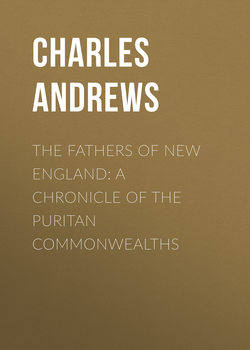Читать книгу The Fathers of New England: A Chronicle of the Puritan Commonwealths - Andrews Charles McLean - Страница 3
CHAPTER III
COMPLETING THE WORK OF SETTLEMENT
ОглавлениеThrough the portal of Boston at one time or another passed all or nearly all those who were to found additional colonies in New England; and from that portal, willingly or unwillingly, men and women journeyed north, south, and west, searching for favorable locations, buying land of the Indians, and laying the groundwork for permanent homes and organized communities. In this way were begun the colonies of Rhode Island, Connecticut, New Haven, and New Hampshire, each of which sprang in part from the desire for separate religious and political life and in part from the migratory instinct which has always characterized the Englishman in his effort to find a home and a means of livelihood. Sometimes individuals wandered alone or in groups of two or three, but more frequently covenanted companies of men and women of like minds moved across the face of the land, followed Indian trails, or voyaged by water along the coast and up the rivers, usually remaining where they first found satisfaction, but often, in new combinations, taking up the burden of their journeying and moving on, a second, a third, and even a fourth time in search of homes. Abraham Pierson and his flock migrated four times in thirty years, seeking a place where they might find rest under a government according to God.
The frontier Puritan was neither docile nor easily satisfied. He was restless, opinionated, and eager to assert himself and his convictions. The controversies among the elect regarding doctrines and morals often became so heated that complete separation was the only remedy; and wherever there was a migrating leader followers were sure to be found. Hence, despite the dangers from cold, famine, the Indian, and the wilderness, the men of New England were constantly shifting in these earlier years as one motive or another urged them on. Land was plentiful, and, as a rule, easily obtained; opportunities for trade presented themselves to any one who would seek them; and the freedom of earth and sky and of nature unspoiled offered an ideal environment for a closer communion with God. Owing to the many varieties of religious opinion that prevailed among these radical pioneers, each new grouping and consequent settlement had an individuality of its own, determined by the personality of its leader and by the ideas that he represented. Thus Williams, Clarke, Coddington, and Gorton influenced Rhode Island; Hooker, Haynes, and Ludlow, Connecticut; Davenport, Eaton, and Pierson, New Haven; and Wheelwright and Underhill, New Hampshire.
Roger Williams, the founder of Providence – the first plantation to be settled in what was later the colony of Rhode Island – was driven out of Boston because he called in question the authority of the government, denied the legality of its land title as derived from the King, and contested the right of the magistrates to deal with matters ecclesiastical. Making his way through the wilderness in the winter of 1635-1636, he finally settled on the Mooshassuc River, calling the place Providence; and in the ensuing two years he gathered about him a number of those who found the church system of Massachusetts intolerable and the Erastian doctrines of the magistrates, according to which the sins of believers were to be punished by civil authority, distressing to their consciences. They drew up a plantation covenant, promising to subject themselves "in active or passive obedience to all such orders or agreements" as might be made for the public good in an orderly way by the majority vote of the masters of families, "incorporated together into a town fellowship," but "only in civill things." Thus did the men of Providence put into practice their doctrine of a church separable from the state, and of a political order in which there were no magistrates, no elders exercising civil as well as spiritual authority, and no restraint on soul liberty.
A year or two later William Coddington, loyal ally of Anne Hutchinson, with others – Clarke, Coggeshall, and Aspinwall, who resented the aggressive attitude of Boston – purchased from the Indians the island of Aquidneck in Narragansett Bay and at the northern end planted Pocasset, afterwards Portsmouth, the second settlement in the colony of Rhode Island. They, too, entered into a covenant to join themselves into a body politic and elected Coddington as their judge and five others as elders. But this modeling of the government after the practices of the Old Testament was not pleasing to a majority of the community, which desired a more democratic organization. After a few months, in the spring of 1639, Coddington and his followers therefore journeyed southward and established a third settlement at Newport. Here the members adopted a covenant, "engaging" themselves "to bear equall charges, answerable to our strength and estates in common," and to be governed "by major voice of judge and elders; the judge to have a double voice." Though differing from the system as developed in Massachusetts, the Newport government at the beginning had a decidedly theocratic character.
